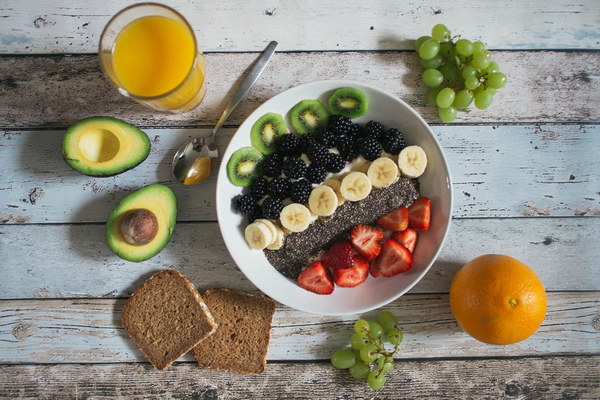Recovering from a Chemical Pregnancy A Guide to Post-Procedure Nutritional Support
Introduction:
A chemical pregnancy, also known as an early miscarriage, can be an emotionally challenging experience. While it's important to focus on emotional healing, it's also crucial to address the physical needs of the body, especially in terms of nutritional support. This article provides a comprehensive guide on how to properly nourish yourself after a chemical pregnancy to aid in recovery and prepare for future attempts.
1. Understanding the Nutritional Needs Post-Chemical Pregnancy
After a chemical pregnancy, the body undergoes a period of healing. It's essential to provide it with the right nutrients to support this process. Here's a breakdown of the key nutrients you should focus on:
a. Folic Acid: This B vitamin is crucial for DNA synthesis and repair. It's especially important for women trying to conceive, as it helps prevent neural tube defects in the fetus. Aim for at least 400 mcg of folic acid daily.
b. Iron: Iron deficiency can exacerbate fatigue and weakness, which are common symptoms post-miscarriage. Include iron-rich foods such as lean meats, poultry, fish, beans, lentils, and fortified cereals in your diet. Additionally, consider a prenatal vitamin with iron, but consult with your healthcare provider first.
c. Protein: Protein is essential for tissue repair and muscle strength. Consume lean proteins like chicken, turkey, tofu, eggs, and Greek yogurt to ensure adequate intake.
d. Calcium and Vitamin D: These nutrients are vital for bone health and can help mitigate the risk of osteoporosis. Incorporate dairy products, fortified plant milks, and fatty fish into your diet. Vitamin D can also be obtained through sunlight exposure.
e. Omega-3 Fatty Acids: These healthy fats are important for heart health and may help reduce inflammation. Fish, flaxseeds, chia seeds, and walnuts are excellent sources of omega-3s.
2. Meal Planning and Snacking Strategies
A balanced diet is key to recovery. Here are some tips for meal planning and snacking:
a. Eat Small, Frequent Meals: This can help manage any nausea or vomiting that may occur post-miscarriage. Try to include a variety of nutrients in each meal.
b. Stay Hydrated: Drink plenty of water throughout the day. If plain water is unappealing, try herbal teas or clear broths.
c. Include a Variety of Foods: Aim for a diverse diet that includes fruits, vegetables, whole grains, lean proteins, and healthy fats.
d. Prepare for Emergencies: Keep healthy snacks like nuts, seeds, yogurt, and fruit on hand for when you're feeling peckish.
3. Prenatal Vitamins and Supplements
In addition to a balanced diet, many women opt to take prenatal vitamins and supplements to ensure they're getting all the necessary nutrients. Here's what you should consider:
a. Prenatal Vitamins: These are formulated to meet the increased nutritional demands of pregnancy. Look for a prenatal vitamin with at least 400 mcg of folic acid, 27 mg of iron, and 800 IU of vitamin D.
b. Omega-3 Supplements: If you're not getting enough omega-3 fatty acids through diet, consider a supplement. Consult with your healthcare provider before starting any new supplement.
c. Probiotics: These can help maintain a healthy gut flora and may aid in digestion. Check with your healthcare provider before taking probiotics, especially if you have a history of gastrointestinal issues.

4. Mindful Eating and Avoiding Potential Triggers
After a chemical pregnancy, it's important to be mindful of your eating habits and avoid any foods that may trigger discomfort or exacerbate symptoms:
a. Avoid Processed Foods: These can be high in unhealthy fats and sugars, which can contribute to inflammation and fatigue.
b. Limit Caffeine: High caffeine intake has been linked to an increased risk of miscarriage. Limit your caffeine consumption to 200 mg per day, which is equivalent to about one 8-ounce cup of coffee.
c. Pay Attention to Food Sensitivities: If certain foods cause discomfort, it may be helpful to eliminate them from your diet temporarily.
5. Seek Professional Advice
It's always best to consult with your healthcare provider or a registered dietitian when planning your post-chemical pregnancy nutritional strategy. They can provide personalized advice based on your individual health needs and any underlying conditions.
Conclusion:
Recovering from a chemical pregnancy is a delicate process that requires both emotional and physical care. By focusing on a balanced diet rich in essential nutrients and consulting with healthcare professionals, you can support your body's healing journey. Remember, patience and self-care are key during this time, and nourishing your body will help you move forward with hope and strength.









